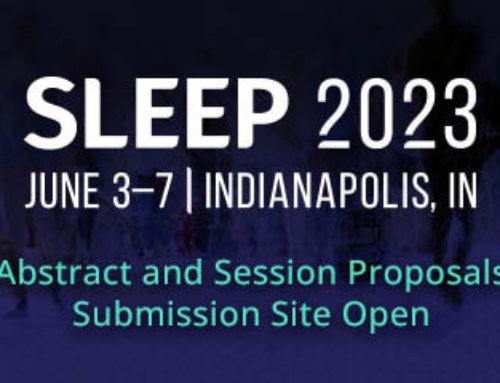EMBARGOED FOR RELEASE
June 9, 2008, at 12:01 a.m.
CONTACT:
Kathleen McCann
(708) 492-0930, ext. 9316
WESTCHESTER, Ill. – One week of sleep extension improves resilience during subsequent sleep restriction, and facilitated recovery thereafter, showing that nightly sleep duration exerts long-term effects, according to a research abstract that will be presented on Monday at SLEEP 2008, the 22nd Annual Meeting of the Associated Professional Sleep Societies (APSS).
The study, authored by Tracy L. Rupp, PhD, of the Walter Reed Army Institute of Research, focused on 11 males and 13 females, who were randomly assigned to either an Extended (10 hours time in bed) or Habitual sleep group for one week followed by one baseline, seven sleep restriction (three hours time in bed), and five recovery nights (eight hours time in bed). Throughout baseline, restriction and recovery, volunteers were administered the Psychomotor Vigilance Task (PVT), Maintenance of Wakefulness Test (MWT), and Stanford Sleepiness Scale (SSS).
According to the results, sleep latency was longer for the Extended group on day one. During restriction, PVT performance and alertness declined in both groups, but declines were faster for the Habitual group. During recovery, Extended group PVT performance was restored to baseline after the first recovery night, although alertness scores remained low. For the Habitual group, PVT performance failed to recover, although SSS and MWT scores were restored to baseline after one to two nights of recovery sleep.
“The present study reveals that protective effects accrue from extending the duration of nightly sleep,” said Dr. Rupp. “Specifically, the deficits in performance and alertness that result from subsequent sleep loss are minimized – and the speed with which recovery from sleep loss is enhanced – when ‘extra’ sleep has previously been obtained. These findings suggest that individual differences in resilience to sleep loss are at least partly a function of modifiable long-term sleep habits, rather than being an unmodifiable, trait-like characteristic of individuals. From a practical standpoint, this suggests that the benefits of sleep can effectively be ‘banked’ and later ‘withdrawn’ as needed to optimize alertness and performance during subsequent periods of sleep loss.”
It is recommended that adults get between seven and eight hours of nightly sleep.
The American Academy of Sleep Medicine (AASM) offers the following tips on how to get a good night’s sleep:
- Follow a consistent bedtime routine.
- Establish a relaxing setting at bedtime.
- Get a full night’s sleep every night.
- Avoid foods or drinks that contain caffeine, as well as any medicine that has a stimulant, prior to bedtime.
- Do not bring your worries to bed with you.
- Do not go to bed hungry, but don’t eat a big meal before bedtime either.
- Avoid any rigorous exercise within six hours of your bedtime.
- Make your bedroom quiet, dark and a little bit cool.
- Get up at the same time every morning.
Those who suspect that they might be suffering from a sleep disorder are encouraged to consult with their primary care physician or a sleep specialist.
The annual SLEEP meeting brings together an international body of 5,000 leading researchers and clinicians in the field of sleep medicine to present and discuss new findings and medical developments related to sleep and sleep disorders.
More than 1,150 research abstracts will be presented at the SLEEP meeting, a joint venture of the AASM and the Sleep Research Society. The three-and-a-half-day scientific meeting will bring to light new findings that enhance the understanding of the processes of sleep and aid the diagnosis and treatment of sleep disorders such as insomnia, narcolepsy and sleep apnea.
SleepEducation.com, a patient education Web site created by the AASM, provides information about various sleep disorders, the forms of treatment available, recent news on the topic of sleep, sleep studies that have been conducted and a listing of sleep facilities.
Abstract Title: Sleep Extension Improves Alertness and Performance During and Following 7 Nights of Subsequent Sleep Restriction
Presentation Date: Monday, June 9
Category: Sleep Deprivation
Abstract ID: 0325
# # #








